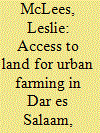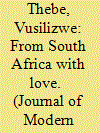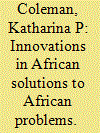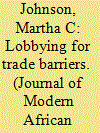|
|
|
Sort Order |
|
|
|
Items / Page
|
|
|
|
|
|
|
| Srl | Item |
| 1 |
ID:
108611


|
|
|
|
|
| Publication |
2011.
|
| Summary/Abstract |
People in sub-Saharan Africa rely on a variety of informal mechanisms to gain access to land for urban farming. However, the literature on land tenure focuses on gaining access to land for housing, whereas farming, which is highly visible in the urban landscape of Dar es Salaam, Tanzania, requires farmers to negotiate their access in ways distinct from housing. A close examination of four open-space farms in Dar es Salaam reveals that there are different methods of gaining access to land for farming as opposed to housing. Additionally, theorising this access reveals that the landowners who allow farmers on their land for food production also derive benefits. This can provide a framework for current efforts to integrate urban agriculture into the city zoning plans.
|
|
|
|
|
|
|
|
|
|
|
|
|
|
|
|
| 2 |
ID:
108607


|
|
|
|
|
| Publication |
2011.
|
| Summary/Abstract |
Against the background of conflict in the Great Lakes Region, the UK and France promised, at their 1998 Saint-Malo summit, to set aside rivalries and cooperate on Africa. In subsequent Anglo-French gatherings, they singled out the DRC and pledged to work together there to promote peace and tackle poverty. This article asks whether this coordination took place and whether it involved a 'deconflictualisation' of approaches, 'coincidental' cooperation, or 'sustained and reciprocal' collaboration. It looks for evidence of institutionalisation of UK-French ties and policy cooperation in the fields of peacebuilding and poverty reduction. It then identifies the pressures for, and barriers to, collaboration, focusing particularly on the role of interests, foreign policy norms, institutional factors and resource constraints. It concludes by setting out the wider implications of UK-French cooperation and the limited prospects of closer future collaboration.
|
|
|
|
|
|
|
|
|
|
|
|
|
|
|
|
| 3 |
ID:
108614


|
|
|
|
|
| Publication |
2011.
|
| Summary/Abstract |
In the 1980s and early 1990s, sending remittances from South Africa posed major challenges for Ndebele migrants. As a result households receiving remittances only did so at irregular intervals. With increased diasporisation into South Africa, it was to be expected that new channels would open up. This article explores what is known as the malayisha system, its role and significance as an informal channel of remittances into Ndebele society. It argues that the system bridged the geographical gap between Matabeleland and Johannesburg, averting food insecurity and poverty for semi-proletarian households in Matabeleland. By facilitating the movement of goods and people between Matabeleland and South Africa, the system became instrumental in the quest of households to reconstruct their livelihoods after the destruction of their rural-urban-based livelihoods in Zimbabwe due to perennial droughts and ESAP. As a result, the services of omalayisha are highly sought-after, by both the migrant community in South Africa and households in Matabeleland.
|
|
|
|
|
|
|
|
|
|
|
|
|
|
|
|
| 4 |
ID:
108605


|
|
|
|
|
| Publication |
2011.
|
| Summary/Abstract |
Three critical trends in the evolving practice of regional peacekeeping in sub-Saharan Africa have undermined the usefulness of the common conceptual dichotomy between regional peacekeeping and UN/global peacekeeping. First, sub-Saharan African states have distanced themselves from long-term autonomous regional peacekeeping, and currently favour explicitly interim missions that are a prelude rather than an alternative to UN peacekeeping. Second, the analytically clear line between regional peacekeeping and the separate sub-Saharan African tradition of solidarity deployments (i.e. military support of embattled governments) has in practice become blurred, and the regional vs global peacekeeping dichotomy not only fails to acknowledge this trend but helps to obscure it. Finally, sub-Saharan African states are increasingly addressing regional conflicts by participating in UN operations deployed in the region. UN peacekeeping has thus emerged as a preferred form of regional peacekeeping in sub-Saharan Africa.
|
|
|
|
|
|
|
|
|
|
|
|
|
|
|
|
| 5 |
ID:
108609


|
|
|
|
|
| Publication |
2011.
|
| Summary/Abstract |
Over the last two decades, developing countries have lowered trade barriers considerably. As a result, they have experienced a surge in food commodity imports. In Ghana, Senegal and Cameroon, a flood of frozen poultry imports in the late 1990s and early 2000s threatened domestic poultry producers. In response, they organised to demand protectionist measures. This article examines why the Cameroonian and Senegalese governments responded to these demands while the Ghanaian government did not. Employing data from interviews in Senegal, newspaper coverage in all three countries, and documentation from non-governmental organisations, it argues that Cameroonian, and to a lesser extent Senegalese, producers were able to influence government policy because they faced few barriers to collective action and built alliances with consumers before lobbying government. The findings suggest that a public choice, interest group-focused approach is still useful for explaining policy outcomes in West Africa.
|
|
|
|
|
|
|
|
|
|
|
|
|
|
|
|
| 6 |
ID:
108612


|
|
|
|
|
| Publication |
2011.
|
| Summary/Abstract |
Many sub-Saharan African societies have undergone significant political shifts in the last two decades. Changes in political representation and leadership have generated new forms of political mediation and communication. This article interrogates one of the most visible transformations in Kinshasa's political society: television news reports about urban misery, often resulting from a malfunctioning state, in which Kinshasa's inhabitants testify about their difficulties and press fellow citizens, as well as local and national leaders, to bring about change. Exposing suffering is a shame mobilisation strategy, and so becomes a political act. Through the discursive and visual aesthetics of the proximity account, citizens and political leaders are inserted into one political community. The main argument of this article is that the proximity account illustrates a new kind of political communication. In this article I analyse the socio-political contexts in which the proximity report emerged and became popular. I trace the materialisation of this new kind of interaction between political leaders and citizens to the transformation of the late Zaïrian 'state', to vernacular understandings of 'democracy', and to the influence of NGO activities and Pentecostal Christianity.
|
|
|
|
|
|
|
|
|
|
|
|
|
|
|
|
|
|
|
|
|